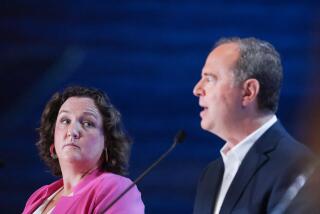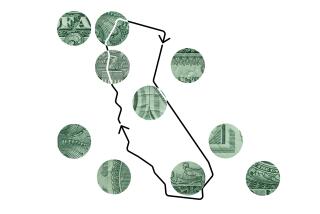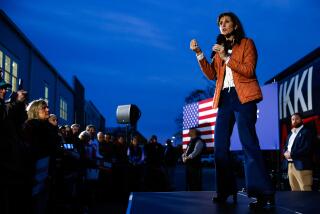Massachusetts Senate race tests feelings about Wall Street
The race is for a U.S. Senate seat in Massachusetts, but it’s really a referendum on Wall Street.
On one side is Democrat Elizabeth Warren, the architect of the new Consumer Financial Protection Bureau and an inspiration for the Occupy Wall Street movement.
On the other: incumbent Republican Scott Brown, one of the biggest recipients of campaign contributions from the financial industry.
Brown is campaigning on traditional Republican themes of smaller government and lower taxes. But Warren is taking a more unusual tack — aligning herself squarely with the Occupy protesters.
Wall Street and its money-driven culture may seem like an easy target, but Warren’s strategy is not without risk.
Just 24% of voters nationwide said they supported the Occupy Wall Street movement in an NBC News/Wall Street Journal poll this month, down from 29% a month earlier.
“The more it turns into a movement that disrupts people’s lives or looks like people who are just out to foment trouble or be a demonstration of anger, the more there might be a backlash,” said Norman Ornstein, a political scholar at the American Enterprise Institute think tank.
Even as Warren gains traction in the polls, most Democrats have been hesitant to embrace the Occupy protests. But her message could appeal to Senate candidates in New York, New Jersey, Maryland and Rhode Island, states in which the Occupy message carries greater appeal, said Jennifer Duffy, senior editor of the nonpartisan Cook Political Report.
“Every candidate’s watching her because she’s something of a phenomenon,” Duffy said. “They’re not so ready to embrace the protests, but they’re certainly ready to embrace the idea of the 99% — the middle class — being left behind, specifically at the hands of Republicans.”
Warren’s campaign rhetoric wasn’t dreamed up by a political consultant.
The Harvard University law professor has spent years researching the financial struggles of average Americans and said she’s been “protesting Wall Street for a very long time.”
She roiled the race this fall with her strong support for the Occupy movement, declaring, “I created much of the intellectual foundation for what they do.”
Such comments sparked attacks from Republicans and drew the ire of some protesters, who bristled at her seeming to take credit for the encampments that sprung up from Boston to Los Angeles. Warren has since emphasized that there’s plenty of credit to go around.
“I think after three years with no accountability, people across this country are madder than ever,” Warren said after a Democratic debate at Stonehill College on Dec. 6.
“They’ve watched the people who brought us the financial crisis walk away, and walk away with their pockets stuffed with money. They know that’s not right,” she said. “I think it’s a key part of the protests.”
Warren became a national figure in the wake of the financial crisis, grilling executives as head of the watchdog panel overseeing the $700-billion bailout fund and then aggressively battling Republicans to create the consumer bureau, an agency she proposed in 2007.
Her sharp criticism of big banks has helped make her a hero to liberals looking for someone to voice the frustrations that have fueled the protests.
“Not only does she have brains and intellect, but she’s got concerns for our issues,” said Rita Sebastian, 58, of Falmouth, Mass. The Occupy Boston protester plans to vote for Warren.
Many politicians actively court Wall Street contributors, but Warren so far has eschewed the big wallets of financial executives.
Just 3.5% of Warren’s contributions come from the finance, insurance and real estate sector, compared with 12.4% of Brown’s, according to the Center for Responsive Politics, which tracks campaign spending.
Strong Republican opposition led President Obama to bypass Warren as his nominee to head the consumer bureau. But as an administration advisor, she helped get the bureau operating before she stepped down last summer. Liberal groups urged her to run for the Senate.
She quickly became the front-runner for the Democratic nomination after raising $3.15 million within weeks of declaring her candidacy in September.
Contributions poured in from around the country, including $2,500 checks from actress Barbra Streisand and DreamWorks Animation Chief Executive Jeffrey Katzenberg. In November, Warren attended a Hollywood fundraiser at producer Norman Lear’s home.
Brown raised $12.5 million from early 2011 through the end of September, the latest data available. But in just a few weeks, Warren doubled Brown’s entire third-quarter fundraising total of $1.5 million by stressing the need to fight big business in Washington to help rebuild the middle class.
A moderate Republican, Brown won the seat in an upset in 2009 by running on a platform opposing Obama’s healthcare reform legislation. Besides focusing on lower taxes, he is stressing his attempts at bipartisanship.
“His main focus is getting the people of Massachusetts back to work,” said Tim Buckley, a spokesman for the state Republican Party.
The GOP has tried to use Warren’s support for the Occupy protests to portray her as an extremist.
The Massachusetts Republican Party has released a video dubbing Warren the “matriarch of mayhem” — interspersing her comments with images of protesters being arrested and decrying capitalism.
Crossroads GPS, a high-powered national Republican advocacy group, has aired TV ads in Massachusetts with similar images, blasting Warren for siding “with extreme left protests.”
But Warren pulled ahead of Brown in the latest poll this month. And seeing the effectiveness of her anti-Wall Street message, Crossroads reversed course.
In a TV ad that began airing this month, the group used Warren’s time as head of the bailout oversight panel to try to link her to Wall Street.
“Congress had Warren oversee how your tax dollars were spent, bailing out the same banks that helped cause the financial meltdown,” the ad said.
Warren, who had no say in how bailout funds were allocated, drew bipartisan praise for aggressive questioning of financial executives and Obama administration officials about how they were using the money. She called the new ad ridiculous.
The skirmish showed both sides are trying to nationalize the race, Duffy said.
“It’s a huge race for Wall Street,” she said. The industry worries that if Warren wins, “she’s in a position to make their lives extremely difficult.”







